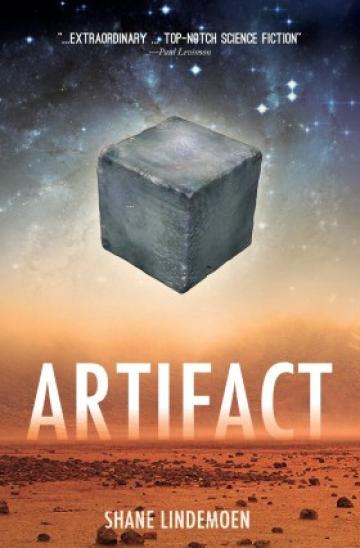KGB Inteview: Shane Lindemoen
Shane Lindemoen is boldly going in the direction of great Sci-Fi authors before him. Blessed with the talent and the work ethic to create freshly-imagined worlds, time-twisting plots, and fantastical characters that light up the page, and with an award-winning debut novel, Artifact, making sonic waves, the future is bright for this writer, who took time to answer the following questions for KGB.
Tell us about your writing life. What got you interested in being a novelist, and what draws you to the Sci-Fi/Fantasy genre?
The biggest draw for me was the escapism. I hit the genre stuff hard in high school, leaning more toward science fiction. I liked how crazy it could be while staying grounded in realism. Like a lot of people, my Rubicon was Star Trek. The writing started because I very much wanted to be a part of subverting all the negative things in life with the positive. I wanted to slink in undetected beneath the paranoia and fear that people have for the future, to slide in under the politics and religion of it all, and do my small part in inspiring goodwill and hope.
That's science fiction to me: a way to get people thinking about surviving extinction, and about overcoming so many meaningless differences and obstacles that have held us back for so long. Writing was this platform for sharing a thousand dreams and a thousand ideas in a way that wouldn't trigger any of that hate. It became a way to flank cynicism and catch it off guard. Because maybe, just maybe, I could reach that one kid who's going to grow up fascinated in the things I've written about, and invent a warp drive or something.
That's the power of science fiction. That's why it's the most important genre in literature.
Congratulations on Artifact and its Gold 2014 National Independent Publisher Book Award. The novel has a complex, futuristic plot, but it also hinges on age-old quests for knowledge and, ultimately, human survival. How did you conceive of this imaginative scenario, and what were the challenges creating something set in the future but with timeless ramifications.
Thanks for the good words. Artifact came from a confluence of odd events. I finished re-reading Illium by Dan Simmons for the umpteenth time, and he used a passage from Proust's Search for Lost Time, volume III, The Guarmantes Way, that I couldn't get out of my head: “People of taste tell us that Renoir is a great 18th century painter. But in so saying, they forget the element of Time, and that it took a great deal of time, even at the height of the nineteenth century, for Renoir to be hailed as a great artist.
To succeed thus in gaining recognition, the original painter, or the original writer proceeds on the lines of the oculist. The course of treatment they give us by their painting or by their prose is not always pleasant. When it is at an end the practitioner says to us: ‘Now look!' And, lo and behold, the world around us (which was not created once and for all, but is created afresh as often as an original artist is born) appears to us entirely different from the old world, but perfectly clear. Women pass in the street, different from those we formerly saw, because they are Renoirs, those Renoirs we persistently refused to see as women.
The carriages, too, are Renoirs, and the water, and the sky; we feel tempted to go for a walk in the forest which is identical with the one which when we first saw looked like anything in the world except a forest, like for instance a tapestry of innumerable hues but lacking precisely the hues peculiar to a forest.
Such is the new and perishable universe which has just been created. It will last until the next geological catastrophe is precipitated by a new painter or writer of original talent.”
This was at a time when I noticed an alarming characteristic of my book and movie collection: I had tons of books focusing on the end of the world. Books ranging from Wells and Vonnegut to McCarthy and Orwell, and countless others in between. I have religious texts ranging from various iterations of the Bible. I have the Qur'an, and the Mahabharata, and the Tibetan Book of the Dead, and the Book of Mormon, all prophesizing some kind of an end. I have a whole section of my movie library devoted to zombie fiction. I have movies like Terminator, Children of Men, AI, The Matrix, Mad Max, and Sunshine.
It worried me deeply: did this reflect my own taste? Was I that obsessed with the end of civilization, or had I just tapped into some preexisting globalized zeitgeist? Shortly after this, a group of (religious people) began coming to my door once per week to debate, handing out pamphlets depicting the entire planet being consumed by apocalyptic fire, telling me that the end of the world was a certainty, and that the only thing we can do is find god before it all comes crashing down. And I wondered if Proust was right?
If we, right now, are creating reality through the expression of our dreams, like Renoir created the culture of his day through his art. If we are indeed these walking reality machines, could we bring about the end of civilization as a result of some massive confirmation bias? Are we pulling visions of the future straight out of our darkest nightmares? Is it possible to then go the opposite direction, and dream a future of light and prosperity and peace? I wanted to answer those concerns with something. Something that would counter it all, or cancel it out.
I wasn't sure what that was going to look like, but I knew I wanted it to be positive and hopeful. I can't honestly say that I started the project with those overarching themes in mind, but I was told at some point that art has a tendency of freeing itself from the vision of its creator, and becoming its own thing. I know that writers are by nature the prime-movers of their own, internal universes, but there comes a moment amidst the various plot threads when things can only break one direction, where you lose control of the narrative to the story itself.
That's what happened to me by the midway: I lost it, I went "batshit crazy" with it, and by the end I had this monster lying before me packed with a million ideas. At first I worried that I was spreading this story thin, or that I was extending the themes too far, hopelessly trying to fit as many ideas as I could into a single narrative. In the end, I didn't see this as a major problem, because the ultimate goal wasn't in conflict with the method in which the story was told, which was sort of convoluted and choppy by design. I rationalized at the time that the thing I was worried about was probably the same thing the forerunners of the artifact in my story worried about when they created it.
So, to me, the aesthetics and the structure and the plot ended up fitting perfectly. It was a strange mess of a narrative, and the reader got to witness this fractured, disjointed story organize itself into a single coherent thought near the end.
What's your writing goals moving forward?
My next thing is a Sci-Fi story, currently titled Eigengrau, about a crew of astronauts on a rescue mission to Saturn. As they get closer to Saturn everything unravels eerily similar to the events that led up to preceding expedition's disappearance. It's basically about evolution and the singularity, and about humanity's endless war against the unchangeable, deterministic concepts of time, fate, and destiny.
the events that led up to preceding expedition's disappearance. It's basically about evolution and the singularity, and about humanity's endless war against the unchangeable, deterministic concepts of time, fate, and destiny.
So, more genre stuff. Written with homage to all the books and movies I loved as a kid: Humans dropped into extreme situations, all centered round autarchical philosophy and subverted optimism. The structure of Artifact was fractured on purpose, and this time I want to tell a more linear story. But even that linearity only lasts so long. I guess you could say I like writing about the weird gray fringes of epistemology, since the nature of human thought is sort of inherently allover the place.
Even though I'm trying to keep things simpler for the reader, I can't seem to break free from wanting to write the kind of stuff that really captures my attention. Possibly to my detriment, I can't seem to not write selfishly. We'll see if it works again. We'll see. . .
Shane Lindemoen (with guitar) is an award winning novelist from Minnesota. He can usually be found in two places: www.shanelindemoen.org, and www.secretlaboratory.org.
